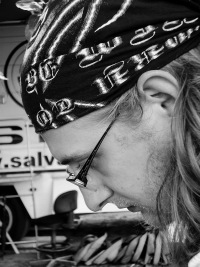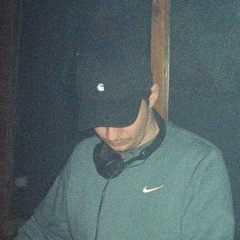Пьер Паоло Пазолини — крупный итальянский кинорежиссер, поэт, писатель, кинодраматург, актер, философ, лингвист, теоретик кино.
Страстная любовь к жизни и – одновременно – сострадание к окружающей его нищете приводят Пазолини в ряды марксистов. Будучи марксистом, Пазолини воспринимает всё происходящее вокруг него в контексте истории – как момент истории, разворачивающейся прямо на его глазах.
Как и другие крупные левые интеллектуалы послевоенного времени, в том числе из Франкфуртской школы, Пазолини чувствовал, что наступает какая-то совершенно новая эпоха, обладающая способностью превращать и извращать привычные явления социальной, психологической, духовной жизни. Что в этом новом времени пролетариат – уже не пролетариат, а буржуазия – не буржуазия.
«Для молодого человека сегодня всё иначе: ему гораздо сложнее смотреть на буржуазию объективно, глазами другого социального класса. Поскольку буржуазия торжествует, она обуржуазивает также рабочих и бывших колониальных крестьян. Короче говоря, через неокапитализм буржуазия становится человеческим состоянием. Те, кто от рождения следуют в русле этой энтропии, не могут быть вне неё», – писал он.
Пожалуй, переломным фильмом, ознаменовавшим уход в какой-то новый, неведомый доселе творческий поиск, в творчестве Пазолини стали «Птицы большие и малые». В этой картине Пазолини впервые в своем творчестве воссоздал жизнь не «в формах самой жизни», а обратившись к иносказанию, философской сказке, притче.
28 июля 1967 года New York Times отозвалась о фильме так: «Никто – по крайней мере, никто из критиков – не оказался способен понять, что именно Пазолини хотел сказать [в этом фильме], кроме той идеи, что никто не знает куда он идет, и что сам мир изумителен, полон различными людьми, которые разделены на тех, кто охотится, и тех, на кого охотятся, на ястребов и воробьёв (в американском прокате фильм вышел под названием «Ястребы и воробьи» – прим. авт.). Тем не менее это передано так гениально, юмористично сострадательно... картина пленила, несмотря на все её загадки».
Страстная любовь к жизни и – одновременно – сострадание к окружающей его нищете приводят Пазолини в ряды марксистов. Будучи марксистом, Пазолини воспринимает всё происходящее вокруг него в контексте истории – как момент истории, разворачивающейся прямо на его глазах.
Как и другие крупные левые интеллектуалы послевоенного времени, в том числе из Франкфуртской школы, Пазолини чувствовал, что наступает какая-то совершенно новая эпоха, обладающая способностью превращать и извращать привычные явления социальной, психологической, духовной жизни. Что в этом новом времени пролетариат – уже не пролетариат, а буржуазия – не буржуазия.
«Для молодого человека сегодня всё иначе: ему гораздо сложнее смотреть на буржуазию объективно, глазами другого социального класса. Поскольку буржуазия торжествует, она обуржуазивает также рабочих и бывших колониальных крестьян. Короче говоря, через неокапитализм буржуазия становится человеческим состоянием. Те, кто от рождения следуют в русле этой энтропии, не могут быть вне неё», – писал он.
Пожалуй, переломным фильмом, ознаменовавшим уход в какой-то новый, неведомый доселе творческий поиск, в творчестве Пазолини стали «Птицы большие и малые». В этой картине Пазолини впервые в своем творчестве воссоздал жизнь не «в формах самой жизни», а обратившись к иносказанию, философской сказке, притче.
28 июля 1967 года New York Times отозвалась о фильме так: «Никто – по крайней мере, никто из критиков – не оказался способен понять, что именно Пазолини хотел сказать [в этом фильме], кроме той идеи, что никто не знает куда он идет, и что сам мир изумителен, полон различными людьми, которые разделены на тех, кто охотится, и тех, на кого охотятся, на ястребов и воробьёв (в американском прокате фильм вышел под названием «Ястребы и воробьи» – прим. авт.). Тем не менее это передано так гениально, юмористично сострадательно... картина пленила, несмотря на все её загадки».
Pier Paolo Pasolini is a major Italian film director, poet, writer, screenwriter, actor, philosopher, linguist, film theorist.
Passionate love for life and - at the same time - compassion for the poverty that surrounds him lead Pasolini into the ranks of the Marxists. As a Marxist, Pasolini perceives everything that happens around him in the context of history - as a moment of history unfolding right before his eyes.
Like other major left-wing intellectuals of the post-war period, including those from the Frankfurt School, Pasolini felt that some completely new era was approaching, with the ability to transform and pervert the usual phenomena of social, psychological, spiritual life. That in this new time the proletariat is no longer the proletariat, and the bourgeoisie is not the bourgeoisie.
“For a young man today, everything is different: it is much more difficult for him to look at the bourgeoisie objectively, through the eyes of another social class. Since the bourgeoisie triumphs, it also bourgeoisie the workers and former colonial peasants. In short, through neocapitalism the bourgeoisie becomes a human condition. Those who from birth follow the course of this entropy cannot be outside of it, "he wrote.
Perhaps, the turning point film, which marked the departure into some new, hitherto unknown creative search, in the work of Pasolini was "Birds Big and Small". In this painting, Pasolini, for the first time in his work, recreated life not “in the forms of life itself,” but turning to an allegory, a philosophical tale, a parable.
On July 28, 1967, the New York Times commented on the film: “No one - at least none of the critics - was able to understand exactly what Pasolini wanted to say [in this film], except the idea that no one knows where he was going. , and that the world itself is amazing, full of different people, who are divided into those who hunt and those who are hunted, hawks and sparrows (in the American box office the film was released under the name "Hawks and Sparrows" - ed.). Nevertheless, it is conveyed so brilliantly, humorously compassionately ... the picture captivated, despite all its mysteries.
Passionate love for life and - at the same time - compassion for the poverty that surrounds him lead Pasolini into the ranks of the Marxists. As a Marxist, Pasolini perceives everything that happens around him in the context of history - as a moment of history unfolding right before his eyes.
Like other major left-wing intellectuals of the post-war period, including those from the Frankfurt School, Pasolini felt that some completely new era was approaching, with the ability to transform and pervert the usual phenomena of social, psychological, spiritual life. That in this new time the proletariat is no longer the proletariat, and the bourgeoisie is not the bourgeoisie.
“For a young man today, everything is different: it is much more difficult for him to look at the bourgeoisie objectively, through the eyes of another social class. Since the bourgeoisie triumphs, it also bourgeoisie the workers and former colonial peasants. In short, through neocapitalism the bourgeoisie becomes a human condition. Those who from birth follow the course of this entropy cannot be outside of it, "he wrote.
Perhaps, the turning point film, which marked the departure into some new, hitherto unknown creative search, in the work of Pasolini was "Birds Big and Small". In this painting, Pasolini, for the first time in his work, recreated life not “in the forms of life itself,” but turning to an allegory, a philosophical tale, a parable.
On July 28, 1967, the New York Times commented on the film: “No one - at least none of the critics - was able to understand exactly what Pasolini wanted to say [in this film], except the idea that no one knows where he was going. , and that the world itself is amazing, full of different people, who are divided into those who hunt and those who are hunted, hawks and sparrows (in the American box office the film was released under the name "Hawks and Sparrows" - ed.). Nevertheless, it is conveyed so brilliantly, humorously compassionately ... the picture captivated, despite all its mysteries.
У записи 15 лайков,
2 репостов,
444 просмотров.
2 репостов,
444 просмотров.
Эту запись оставил(а) на своей стене Сергей Григорян



































